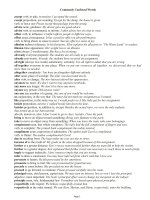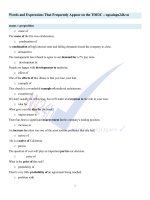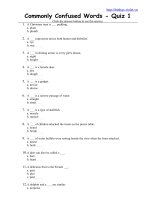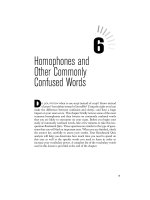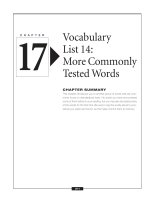Commonly confused expressions
Bạn đang xem bản rút gọn của tài liệu. Xem và tải ngay bản đầy đủ của tài liệu tại đây (8.17 KB, 1 trang )
Commonly confused expressions
Here is a quick overview of some phrases and expressions that are commonly confused.
Supposed to / used to
You are not
supposed to
break the rules. (NOT You are not suppose to break the rules.)
I am
used to
living alone. (NOT I am use to living alone.)
It is wrong to drop the ‘d’ in
supposed and used
. However, this is a mistake that many people make.
Beside the point
If something is beside the point, it is not relevant to the point. It is wrong to write ‘besides the point’.
Beside means ‘next to’ or ‘at the side of’. Besides means ‘in addition to.
Couldn’t care less
The expression ‘I could care less’ is always wrong.
I couldn’t care less means ‘I don’t care at all’. However, ‘I could care less’ does not mean that you care a lot.
Whet your appetite
To whet your appetite is to sharpen your appetite. Even mouth-watering delicacies can’t ‘wet your appetite’. The
correct expression is ‘whet your appetite’.
Nip it in the bud
To nip something in the bud is to prevent it from growing into something bigger.
Don’t nip it in the butt. That will not solve your problem.
Toe the line
To toe the line is to adhere to a standard or rule. Don’t write ‘tow the line’.
For all intents and purposes
‘For all intents and purposes’ means ‘pretty much’ or ‘almost completely’. It is wrong to write ‘for all intensive
purposes’.
Bald-faced lie
A bald-faced lie is an audacious lie. The person who tells a bald-faced lie does not make any attempt to disguise it
as truth. However, this does not make it a ‘bold-faced lie’.
Be first to know when grammar rules change! Sign up to our newsletter here: englishgrammar.org (It's free)
Powered by TCPDF (www.tcpdf.org)
